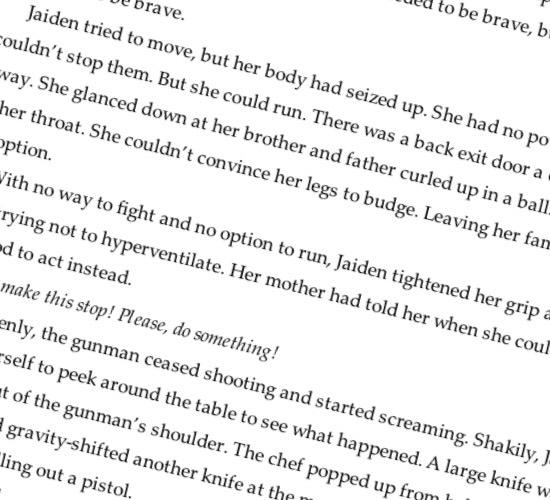Isn’t it great when someone gives you a trophy for coming to the game? No? Good. No one wants a participation trophy…and if you do, eat a happy meal and get over it.
Most of us want to earn the trophy, because the reward tastes sweeter when we sweat for it and prove ourselves worthy. We want to see the protagonist, AKA the main character, earn it. And no, a protagonist doesn’t earn their win by beating the bad guy, getting the girl/boy, or achieving their lifelong goal. They earn it by—wait, I’m getting ahead of myself. First, I need to define the lowest moment story beat.
Dark night of the soul
Some call it “the dark night of the soul” story beat, because it’s the moment your protagonist’s soul is affected in the darkest way, usually experiencing a difficult period in their life. But, depending on what your story is, it may not be soul crushing when the lowest moment happens. Sometimes the protagonist gets everything they ever wanted, yet they realize it’s not what they needed. This story beat can also change depending on the genre. The lowest moment in a rom-com could be less tragic and heart-breaking than a drama.
If I could give my own definition, it would be this: the lowest moment story beat is when your protagonist’s flaw comes in full swing, bringing the story to its darkest point and the protagonist to their knees.
To their knees physically? Sometimes, but I’d rather the protagonist falls to their knees, spiritually.
How a protagonist really earns their win
So, you’re reading a new book that establishes the protagonist’s flaw is pride. She wins the day by getting into a fierce battle, almost dying, then cuts the head off the demon lord. Yay? Sure, if you only want explosions and physical trauma as the stakes for the story. But that doesn’t bring depth, does it?
Now what if your protagonist were to give into their pride by taking a foolish risk, fighting a losing battle and getting most of her army killed and her best friend captured? It’s not only her actions that have hurt her chances of winning, but her flaw influencing her actions. Instead of just conquering the demon lord, she has to conquer her inner demon by swallowing her pride by rallying more troops from a rival captain to win the day.
Tell me honestly, doesn’t that latter story sound better? They both have a fierce battle with lots of death and mayhem, but the climax and stakes of the story matter more when the protagonist’s flaw affects everything. This lowest moment for our protagonist, when she realizes HER actions and flaws have hurt her friend and made the bad guy win, pierces more than any physical wound could.
Sympathizing with the protagonist
Many times in stories, the lowest moment is simply the lowest physical and emotional moment. But when you put in a dash, or rather a heaping tablespoon of your protagonist’s arc into the mix, then you have an epic last act. It makes the final battle that much better when the protagonist has earned their place to be there by conquering their flaw and pressing forward.
Let’s say Hollywood puts out a film that has a protagonist with flaws and goals and a rocking-awesome character arc…hey, just use your imagination. When we have a protagonist who’s not only fighting physical bad guys, but their inner bad guys, things get more intriguing for us. We may never fight a demon lord, but we fully understand making foolish decisions because of pride. Everyone has inner demons, so when the protagonist has them, it makes us connect with them on a deeper level. Guaranteed, we will care more about them. When you see a child fall off their bicycle but still get back up and try again, isn’t it so much more exciting when they finally succeed? No matter if riding a bicycle is impressive to you, it matters because you see the struggle and the determination the kid has to get back up.
Contrast is key
The lowest moment brings depth by including the internal stakes of your character, preferably before the climax of the story. We can appreciate and sympathize with these stakes. Another reason it’s so important to see your main character fail hard is simple, contrast. You can’t tell how white something is until you hold it up to something dark. Contrast provides clarity of how different something is, making us appreciate the apparent change more. If your main character is in a constant state of conflict but never actually fails, it’s not as impressive when they succeed. It is great to watch them get back up after falling.
It doesn’t matter if the main character is fighting a demon lord or fighting to get that dream job, as long as they fail because of their inner demons. It will get people to watch the movie again or read the book a hundred times. We want to root for the people we relate to and who better else than the one who fails as much as we do.
Do you like the lowest moment in a story as much as I do? Tell me below what book or movie has nailed having a lowest moment story beat!


